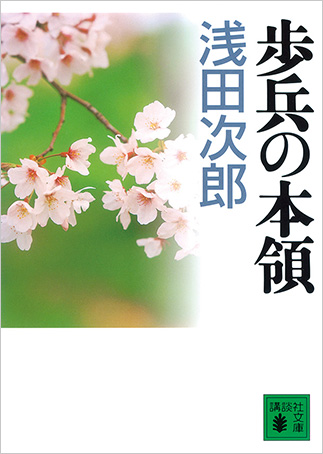
WORK
Hohei no honryō
[The Nature of Infantry Soldiers]
Kōdansha (Kōdansha Bunko), 2004. 328 pp. ¥590. ISBN 978-4-06-273989-4.
Also published in: n/a
The role of Japan’s Self-Defense Forces in relation to the Constitution and recently enacted security legislation has drawn a range of debate and come under the political spotlight. However, there are few vivid and detailed literary depictions of the thoughts and lives of those who serve in the SDF.
In this sense, Asada Jirō’s Hohei no honryō, a collection of linked short stories, is a rare and valuable work that describes the daily life of SDF members. Asada is a Japanese literary heavyweight known for his many bestselling historical novels and currently serves as president of the Japan P.E.N. Club. He also served in the SDF in his young days before becoming a novelist, though, and this book is based on his own experiences and observations. The setting is the 1970s, when the SDF was very different from now. At the time, “wages were excessively low and the working environment entirely awful,” so that those who entered as volunteers included numerous “oddballs” and “young people who, for whatever reason, had nowhere else to go.” At the same time, many of the senior officers had been members of the Imperial Army before 1945, and insidious old military practices remained in use.
Asada applies his characteristically skillful storytelling to this material, adding plentiful touches of humor and human feeling, to brilliantly portray the difficulties SDF members faced and their pride in their work. (NM)
In this sense, Asada Jirō’s Hohei no honryō, a collection of linked short stories, is a rare and valuable work that describes the daily life of SDF members. Asada is a Japanese literary heavyweight known for his many bestselling historical novels and currently serves as president of the Japan P.E.N. Club. He also served in the SDF in his young days before becoming a novelist, though, and this book is based on his own experiences and observations. The setting is the 1970s, when the SDF was very different from now. At the time, “wages were excessively low and the working environment entirely awful,” so that those who entered as volunteers included numerous “oddballs” and “young people who, for whatever reason, had nowhere else to go.” At the same time, many of the senior officers had been members of the Imperial Army before 1945, and insidious old military practices remained in use.
Asada applies his characteristically skillful storytelling to this material, adding plentiful touches of humor and human feeling, to brilliantly portray the difficulties SDF members faced and their pride in their work. (NM)

Translation rights inquiries
Kōdansha Ltd.
(attn. Kitaoka Morio, International Rights Dept.)
2-12-21 Otowa, Bunkyō-ku, Tokyo
112-8001
Tel.: +81-3-5395-4112
Fax: +81-3-3942-7204
Email: m-kitaoka@kodansha.co.jp
(When sending an e-mail, please enter a half-width character "@" instead of a full-width character "@.")

